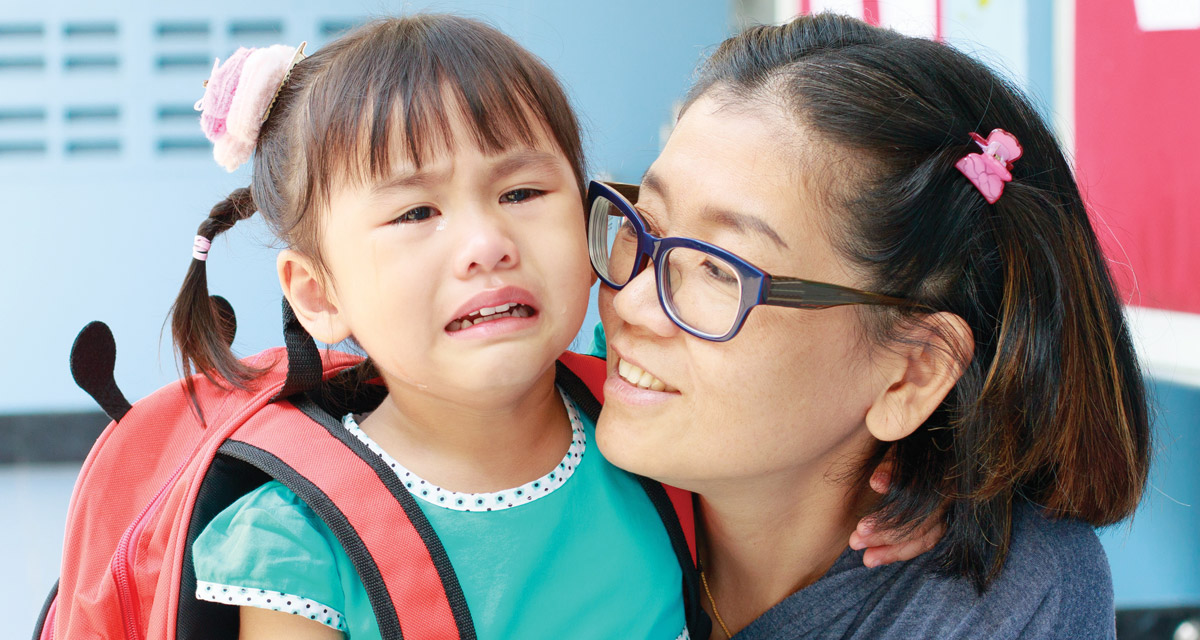BY JON CHURN, Head of School, The Montessori School of Winston-Salem
The anticipation of the first day of school at a new school can raise fear and worry for both our children and us as parents. The good news is that these transition fears most always go away as your child becomes familiar with her/his new school, teachers and classmates. And, this often happens sooner than we anticipate. While these transition moments, by definition, are temporary, there are things we can do as parents to support our children as the first day of school approaches.
The most important first step in supporting our children with these transitions is to be clear ourselves whose fear it is. Is this my child’s fear, or mine? Because much of our parenting mindset is focused on protecting our children, it can be easy to project our worries about new or unknown situations onto our children. This is especially true if we had a lot of first-day worries as children ourselves. If I had certain fears and worries, I am more likely to worry that my child will have those same fears and worries.
This, of course, isn’t always the case. Simply asking your child how he/she feels about their upcoming first day of school will help you determine what, if anything, you can do to help. Note that it is all in how we ask this question, being careful not to plant a seed of worry that may not exist. Asking, “Are you worried about the first day of school?” is a very different question than, “How are you feeling?” or, “Are you excited about the first day of school?”
If you know that your child is indeed feeling fearful or anxious, it is important to ask yourselves, “Do I need to fix this?” Again, as parents, our instinct is often to protect, intercede, act on behalf of our children, but often no action other than listening and validating their fears is needed. As a dad, I needed time to learn this, and it was my daughter who helped me most to understand it. Sometimes what is most needed is just knowing that someone else gets it, gets us, and understands our worries, fears, sadness, etc. I have learned, through much trial and error, three steps to take before I act or attempt to fix a situation for my children.
- Validate feelings. “I understand, sometimes new things can be scary. I feel that way too, sometimes.”
Pause-listen. . . .
- Listen fully without distractions.
Pause-listen….
Pause-listen….
- Ask what is needed. “Is there anything I can do or that you need to feel better? Is there anything that would help ease your worry or fear, etc.?”
Pause-listen….
If and when it is determined that your child is indeed feeling anxious about the first day of school and she/he would like some help, there are many creative ways to make the looming unknown a little more familiar and less scary. Here are just a few suggestions.
- Maintain some consistent routines throughout the summer, which always helps children transition from a summer to a school mindset. Even if your summer routines are a bit more relaxed than school-year routines, having regular bedtime and meal times, maintaining bedtime and morning routines, participating in regular family chores/responsibilities helps children fall back into the more rigorous routines of the school year.
- Have your child’s school connect you with a few families that will be in your child’s new class. This will allow you and your child a chance to meet new classmates and families and perhaps begin some new friendships.
- As the school year approaches, your child can write (or dictate to you if they are not yet writing) a letter to their new teacher about her/himself. This can be illustrated for younger children or include a special photo and be hand-delivered on the first day of school. Sharing details about our lives and what is important to us, even in a letter, can help us feel more connected to someone. And, what child doesn’t like to talk about their family, their pets and their favorite things?
- For younger children, and if okay with the school, visit or have a picnic at the school playground. Seeing and associating a fun activity will help your child orient to this new setting and plant some positive impressions about their new school.
- Have your child be a part of getting their school supplies ready.Participating and having some choice in getting supplies may give your child a sense of empowerment in a situation where they feel they have little control.
- If your school offers an open house for children, by all means, go.These can be wonderful opportunities for your child to meet their teacher, see their class, and even walk around their new school.
- Create a first-day tradition or several. Anything from a special breakfast, an early-morning bike ride to an after-school treat could give your child something familiar and special to balance out their day of newness.
- Lastly, if transitions are significantly difficult, and for some children they are, advocate for your child by contacting the school and letting his/her teacher know what your child’s worries are, and how the school can support them. All good teachers will want to be ready to support each of their children on the first day. You can help them by partnering with them early.
Whether first day fears are ours or our children’s, understanding whose fear it is, validating fears, and taking simple actions, if needed, to empower our children and make the unknown of a new school a little more familiar can help. And remember, these moments of transition, while challenging at times, are temporary.



















